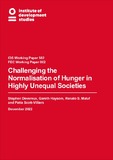Challenging the Normalisation of Hunger in Highly Unequal Societies
| dc.contributor.author | Devereux, Stephen | |
| dc.contributor.author | Haysom, Gareth | |
| dc.contributor.author | Jamil Maluf, Renato Sérgio | |
| dc.contributor.author | Scott-Villiers, Patta | |
| dc.coverage.spatial | Brazil | en |
| dc.coverage.spatial | South Africa | en |
| dc.coverage.spatial | United Kingdom | en |
| dc.date.accessioned | 2022-12-19T14:54:48Z | |
| dc.date.available | 2022-12-19T14:54:48Z | |
| dc.date.issued | 2022-12-19 | |
| dc.identifier.citation | Devereux, S.; Haysom, G.; Maluf, R.S. and Scott-Villiers, P. (2022) Challenging the Normalisation of Hunger in Highly Unequal Societies, IDS Working Paper 582, Brighton: Institute of Development Studies, DOI: 10.19088/IDS.2022.086 | en |
| dc.identifier.isbn | 978-1-80470-076-1 | |
| dc.identifier.issn | 2040-0209 | |
| dc.identifier.uri | https://opendocs.ids.ac.uk/opendocs/handle/20.500.12413/17814 | |
| dc.description.abstract | This paper starts from an empirical observation that levels of hunger or food insecurity in middle-income and high-income countries are often higher than might be expected, and in some cases are rising rather than falling in recent years. We document levels and trends in selected food security indicators for three case study countries: Brazil, South Africa, and the United Kingdom. We argue that, given the availability of resources and state capacity to eradicate hunger in these countries, a process of ‘normalisation’ has occurred, meaning that governments and societies tolerate the persistence of hunger, even when a constitutional and/or legal right to food exists that should make hunger socially, politically, and legally unacceptable. We further argue that one driver of normalisation is the way food (in)security is measured; for instance, the assumption that structural hunger cannot exist in countries that are self-sufficient or surplus producers of food. We suggest that high levels of structural hunger are predictable outcomes in societies characterised by high levels of income and wealth inequality. Next, we develop a simple analytical framework for exploring the normalisation of hunger. Just as famines occur because of failures to intervene to prevent them, so hunger is tolerated because key stakeholders do not exercise their power to eradicate it. We identify four sets of actors who potentially hold such power, but whose failure to act effectively allows hunger to persist: the state; civil society; the public; and hungry people themselves. We conclude by outlining a research agenda to explore the issues raised in this paper further. | en |
| dc.description.sponsorship | IDS Strategic Research Initiative | en |
| dc.language.iso | en | en |
| dc.publisher | Institute of Development Studies | en |
| dc.relation.ispartofseries | IDS Working Paper;582 | |
| dc.rights | This is an Open Access paper distributed under the terms of the Creative Commons Attribution 4.0 International licence (CC BY), which permits unrestricted use, distribution, and reproduction in any medium, provided the original authors and source are credited and any modifications or adaptations are indicated. | en |
| dc.rights.uri | http://creativecommons.org/licenses/by/4.0/ | en |
| dc.subject | Nutrition | en |
| dc.subject | Politics and Power | en |
| dc.subject | Population | en |
| dc.title | Challenging the Normalisation of Hunger in Highly Unequal Societies | en |
| dc.type | IDS Working Paper | en |
| dc.rights.holder | Institute of Development Studies | en |
| dc.identifier.team | Rural Futures | en |
| dc.identifier.doi | 10.19088/IDS.2022.086 | |
| dcterms.dateAccepted | 2022-12-19 | |
| rioxxterms.funder | Default funder | en |
| rioxxterms.version | VoR | en |
| rioxxterms.versionofrecord | 10.19088/IDS.2022.086 | en |
Files in this item
This item appears in the following Collection(s)
-
IDS Research [1671]
Except where otherwise noted, this item's license is described as This is an Open Access paper distributed under the terms of the Creative Commons Attribution 4.0 International licence (CC BY), which permits unrestricted use, distribution, and reproduction in any medium, provided the original authors and source are credited and any modifications or adaptations are indicated.


